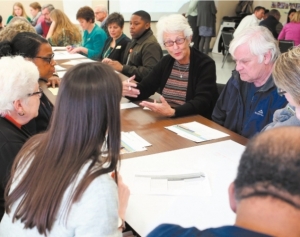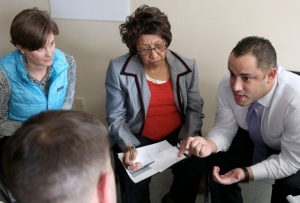Poverty task force meets to 'chip away at the mountain'
By Rochelle Moore
Published in News on February 2, 2018 5:50 AM

News-Argus/CASEY MOZINGO
Attendees of the first Poverty Task Force meeting split into groups to share their ideas Thursday afternoon at WAGES.

News-Argus/CASEY MOZINGO
Katherine MacDonald, of Goldsboro Pediatrics, Sylvia Barnes, representing the NAACP, and Joe Boudy, with First Citizens Bank, participate in a group discussion about poverty Thursday.
More than 70 people from organizations, nonprofits and different sectors of the community met Thursday to start working on solutions to combat poverty in the community.
The first meeting of the poverty task force was held at WAGES, on Royall Avenue, following the recent release of the N.C. Poverty Research Fund study.
The poverty report, "Goldsboro: Isolation and Marginalization in Eastern North Carolina," found 25 percent of Goldsboro residents living in poverty and 46 percent of households making less than $30,000 a year. Almost half of all city children are poor, and one in four children go hungry every day.
The task force meeting was the first effort to set up a framework to address poverty during, at least, the next year.
"The goal of this task force is to use a framework with set goals over a timeline," said Allysa Rouse, community engagement coordinator with the N.C. Justice Center. "The folks in Goldsboro say we need an accelerated timeline."
Rouse shared with the group a task force model, which involves identifying and engaging groups and individuals to be involved, forming a task force of people from all sectors of the community, gathering community input, putting together an asset map that identifies local resources and identifying and implementing solutions.
Those attending the meeting broke into smaller groups and discussed problems, solutions and ideas. They also thought about what methods would result in success in reducing poverty in the area.
"The biggest challenge we saw in the framework ... (is) getting to folks who are experiencing poverty and getting them to give input into what the community needs to be doing to address those issues," said Matt Whittle, Habitat for Humanity of Goldsboro-Wayne executive director.
Several people said they wanted to have people living in poverty to be a part of the task force, in an effort to better understand their needs.
Suzie Acree, executive director of Literacy Connections, said the group needs to create an awareness that the task force is interested in building relationships in the community.
"We felt that was missing in the grassroots outreach," Acree said.
One of the groups recognized a need to have members of the business community involved on the task force, since employment can help move people out of poverty.
Shirley Edwards, WAGES chairwoman, said that members of the group need to evaluate their talents and identify what they can contribute to the effort.
"We need to ask ourselves in this room, what is it that we can comfortably do to eradicate poverty?" Edwards said. "Know what our skill set is and then do it, and then we will chip away at it because it's a big mountain that's got to be chipped away at."
The task force plans to continue meeting once every two months and its subcommittee at other times. A larger community event, which will provide solutions, is planned sometime in the spring or summer.
During the next two months, task force organizers plan to work on inviting people to community meetings, reviewing current surveys or other tools related to their work, conducting phone surveys and canvassing neighborhoods for input.
Other future plans involve seeking support from local governments to move identified solutions forward.
